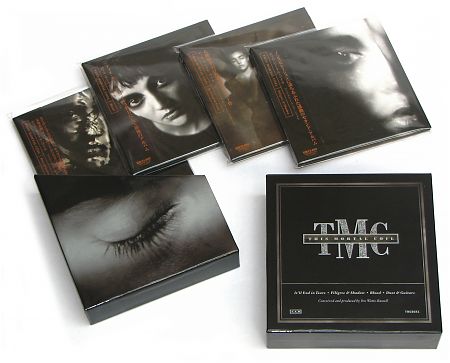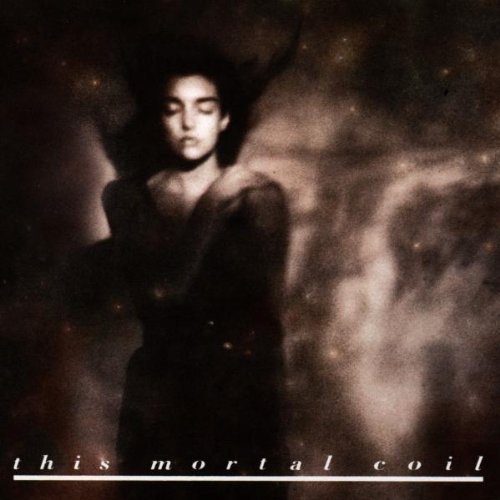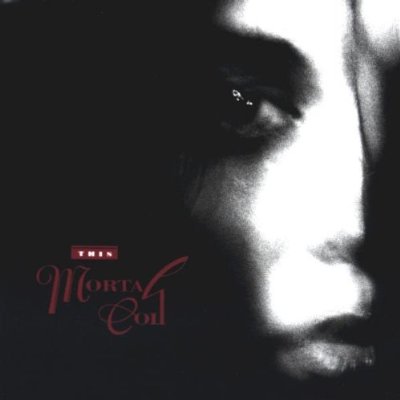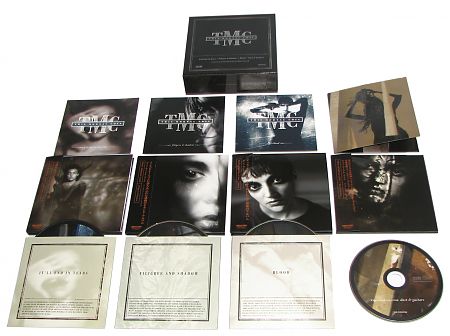
This Mortal Coil
Box Set
4AD TMCBOX1
Release date: 14th November 2011
For in that sleep of death what dreams may come
when we have shuffled off this mortal coil?*
“That’s a good name for a band,” I commented as I spied the advert in Melody Maker for This Mortal Coil’s debut single release. The same night John Peel gave ‘Song To The Siren’ its first play on national radio and I was transfixed. This was something unexpected; scooped from the mists of a forgotten past: enticing, beautiful and utterly convincing. It didn’t leave my turntable for a month.
This Mortal Coil turned out not to be a band, rather, as the 4AD website explains, “a unique collaboration of musicians recording in various permutations, the brainchild of 4AD kingpin Ivo Watts-Russell. The idea was to allow artists the creative freedom to record material outside of the realm of what was expected of them; it also created the opportunity for innovative cover versions of songs personal to Ivo.”
Though ‘Song To The Siren’ created all the impetus for Watts-Russell to move ahead with an album, it was actually the other side of the record which gave him the idea of this collaboration in the first place. 4AD artists Modern English were ending their live sets with a melding of two songs from their debut album, ‘Mesh and Lace’ and the impressed Watts-Russell felt the re-vamped track was worthy of a new release. He suggested the band re-record ‘Sixteen Days’ and ‘Gathering Dust’ in this form but, with the band working on their nearly completed third album, ‘Ricochet Days’, some members felt this would be a retrograde step. Undeterred, Watts-Russell gathered together other musicians from the label and recorded a cover version. Aided by Modern English bassist Michael Conroy and guitarist Gary McDowell, the Cocteau Twins’ Elizabeth Fraser was brought in to record vocals, backed up by Gordon Sharp of Cindytalk, with fellow Twin Robin Guthrie adding guitar and Colourbox’s Martyn Young contributing keyboards.
The resulting nine-minute take of ‘Sixteen Days - Gathering Dust’ was a fine thing; ironically by far the rockiest track This Mortal Coil would ever produce, refining the early sound of Modern English with the guitars hemmed into the background, and brought to new life by Fraser’s extraordinary vocal talents and underpinned by Sharp’s deep, buried harmonies. Unfortunately, this was never a record that was going to be played on the radio, with the four-minute edit ‘Sixteen Days Reprise’ not really convincing. So while ‘Sixteen Days’ was to be the lead song on the twelve-inch version of the single, for the seven-inch, its nominal b-side, ‘Song To The Siren’, was given precedence.
This was a track written by Tim Buckley and Larry Beckett in 1967, but Buckley was dissatisfied with his early attempts at recording it and it did not appear on one of his records until the ‘Starsailor’ album of 1970. Remarkably, The Monkees television show featured the song in its original folk style, with Buckley playing solo with a 12-string guitar, and this is hugely different to his later, reverb-filled version. The song has been covered by other artists before and since but all these are swept into the shade by This Mortal Coil. Sung with remarkable clarity by Elizabeth Fraser and accompanied solely by the beautfully subdued guitar of Robin Guthrie, this is a stunning record. Fraser is every bit as enchanting as the deadly songstresses from Greek mythology and when she cries, “Hear me sing: swim to me, swim to me, let me enfold you. Here I am, here I am, waiting to hold you,” you are already in the ocean heading for a watery grave. Remarkably for 4AD in 1983 the single reached No.66 in the charts and stayed in the independent charts for over one hundred weeks.
The huge success of the single gave Watts-Russell the encouragement to press ahead with an album, utilising the services of many of his signed artists, including the Cocteau Twins, Dead Can Dance, Colourbox, Robbie Grey of Modern English, Mark Cox of the Wolfgang Press and Manuela Rickers of Xmal Deutschland. From the outside, joining Sharp were former Buzzcocks and Magazine vocalist Howard Devoto, violinist Gini Ball and her brother, celloist Martin McGarrick, later of Siouxsie & The Banshees and Therapy?
‘It’ll End In Tears’ was released in October 1984 to critical acclaim, accompanied by the release of Big Star’s ‘Kangeroo’ as a single, one of two Alex Chilton covers included. As an album, ‘It’ll End In Tears’ narrated delicate dreams from the sleep of death; a peace Hamlet may well have embraced as his mind tore itself apart with indecision and doubt. It was arguably the gentlest album released by the label to that point, a far cry from the fury of the Birthday Party, the blank, metronomic assaults of Xmal, the tortured dissonance of the Wolfgang Press and the disturbed, distended funk of Colourbox. Notably, ‘Sixteen Days - Gathering Dust’ was excluded from the final collection, though ‘Song To The Siren’ was there along with the two Chilton covers; a take on Roy Harper’s bittersweet ‘Another Day’; a cover of former Wire man and 4AD artist Colin Newman’s ‘Not Me’; four originals; two tracks written and performed by Dead Can Dance which sounded just like Dead Can Dance; and interestingly a re-working of an old 4AD recording, the mighty Rema-Rema’s ‘Fond Affections’ with Sharp taking over vocal duties backed by the original band’s Mark Cox (then of the Wolfgang Press) and Martyn Young of Colourbox.
‘It’ll End In Tears’ was a great experiment, showing the strength of the 4AD brand by giving freedom to all of the label’s artists to work together to create something completely different. There is beauty here, no lack of emotion and innovation, and often the surprising collaborations produce the best results. The insistent instrumental ‘Fyt’ recorded by Mark Cox and Martyn Young manages to be both disturbing and gorgeous, and it blends straight in to ‘Fond Affections’ where Cox’s whip-like programming fails to unsettle Sharp’s exquisite vocal. The unusual melding of Modern English, Xmal Deutschland and the Cocteau Twins produces the album’s hardest moment with Rickers’ unmistakeable guitar driving along ‘Not Me’, while Guthrie, Fraser and Simon Raymonde shine throughout.
The album reached No.38 in the UK charts where it spent four weeks; the experiment regarded as a success, though not one that many people expected would be followed up due to the constant ebb and flow of artists on the label. This was a mistaken assumption as two years later, a second album ‘Filigree and Shadow’ appeared, spread over two discs and nearly an hour and a quarter in length.
Though featuring in places Dominic Appleton of Breathless, Mark Cox and Andrew Gray of the Wolfgang Press, David Curtis, Alan Curtis and Richard Thomas of Dif Juz, Simon Raymonde of the Cocteau Twins, Peter Ulrich of Dead Can Dance and Steven Young of Colourbox, this was a project more under the control of Watts-Russell and his co-producer John Fryer with only the two, along with Ball and McCarrick, being credited as members of the ‘band’, responsible for “all other instruments, incidentals, loops and treatments”. Nine of the twenty-five tracks have no other contributors, instrumentals all, while there are nine cover versions of old folk and psychedelic songs including two from Tim Buckley; the Talking Heads’ ‘Drugs’ (1982); Pearls Before Swine’s ‘The Jeweller’ (1970), Quicksilver Messenger Service’s ‘Fire Brothers’ (1971); Judy Collins’ ‘My Father’ (1968); Gene Clark’s ‘Strength of Strings’ (1974); Gary Ogan’s ‘I Want To Live’; and Van Morrison’s ‘Come Here My Love’ (1974). There are also covers of former 4AD artists Colin Newman and Bruce Gilbert’s ‘Alone’ and Martyn Young’s old Colourbox b-side ‘Tarantula’. Five tracks were written by the other 4AD contributors.
Compared to the meandering grace of ‘It’ll End In Tears’, this album has more of a contrived sound, lacking the true spontaneity of collaboration and any real sparks of innovation. It is too controlled, too long and too self indulgent. It lacks the twists of a truly unorthodox vocalist and only really shines when the songs break out of the suffocating mould (the tracks on each of the four sides blend into each other). ‘Alone’ shows some fight with Simon Raymonde’s nice guitar work decorating Alison Limerick and Caroline Seaman’s attacking vocals, and indeed side four is the best with Mark Cox’s ‘The Horizon Bleeds and Sucks Its Thumb’ pounding nicely into ‘Drugs’ where Limerick again shows some guts. Other than that, ‘The Jeweller’ has some charm and ‘Strength of Strings’ some beauty, both improved by Appleton’s evocative vocals. On the downside ‘Tarantula’ is an abomination, a truly awful reworking of one of 4AD’s greatest moments, and should have gone straight in the bin.
The album charted at No.53, but This Mortal Coil’s consequent disappearance for five years may have led people to believe the project had more than run its course and, indeed, 1987’s ‘Lonely Is An Eyesore’ compilation hinted the label had found a new method of collaboration amongst its ranks. But, no, 1991 saw the announcement of a new outing and fears were raised when it was revealed it would again be a double album offering twenty-one songs stretching over an hour and a quarter. Like before this was an album created under the firm control of Watts-Russell, who wrote ten of the tracks, and again utilised the services of McCarrick, Appleton and Limerick with additional contributions coming from Kim Deal, Tanya Donelly, Heidi Berry, Pieter Nooten of Clan of Xymox, Caroline Crawley of Shellyan Orphan, Tim Freeman of Frazier Chorus, and Deirdre and Louise Rutowski of Sunset Gun.
The album contained one song written by Nooten and ten cover versions which included two tracks by former Big Star co-leader Chris Bell, taken from his only solo album ‘I Am The Cosmos’. ‘You And Your Sister’ is sung by the Breeders’ Kim Deal and Tanya Donelly and is one of the more straightforward songs on the album though decorated with some nice psychedelic touches, while ‘I Am The Cosmos’ is delivered by Appleton and Deirdre Rutowski and is awkwardly pleasant. ‘Late Night’ is the last track on Syd Barrett’s 1970 debut ‘The Madcap Laughs’ and Crawley sings it simply to minimal backing, while she stretches herself pleasingly on Mary Margaret O’Hara’s ‘Help Me Lift You Up’. Deirdre Rutowski takes the vocal for the cover of The Rain Parade’s ‘Carolyn’s Song’, with Heidi Berry joining the Rutowski sisters for Rodney Crowell’s country classic ‘Till I Gain Control Again’ which had been a number one hit for Crystal Gayle in late 1982. Of course, This Mortal Coil’s version is far bleaker with Watts-Russell again ensuring the sound of all the tracks fits snugly into his overall vision.
As a whole, ‘Blood’ sounds fussily mapped out, with too much crammed into too few restricting ideas, and lacking any real dynamism. The proliferation of vocal tracks certainly helps make it more accessible than the suffocating rigidity of ‘Filigree and Shadow’, but it should have been given more space to burst out of its confines and take on a life of its own. OK, this is one man’s vision and you have to applaud his single-mindedness if not his depth; there are good moments and some really good moments, but how much better would it have been to have thrown the label’s roster into the studio and given them a focal point and a free rein?
‘Blood’ scraped into the lower reaches of the album charts, reaching No.65, and marked the end of This Mortal Coil as an ongoing project. Nothing more was heard until this year when it was announced the albums were being re-mastered from the original analogue studio tapes. While all three albums would be available individually at a later date (replacing the current jewel case versions), the initial release was to comprise exclusively of a limited edition worldwide box set containing a fourth disc, ‘Dust & Guitars’, featuring all of This Mortal Coil’s single tracks as well as the unreleased ‘We Never Danced’, originally intended for a Rough Trade Singles Club release but ultimately withdrawn. Manufactured in Japan and packaged in gatefold ‘paper’ sleeves, the albums are accompanied by inner bags and new booklets with the artwork re-designed by Watts-Russell and Vaughan Oliver at V23.
In truth, this is an achingly beautiful package which you are loathe to open but could look at all day. 4AD’s glory years are long past but they are still able to repackage the material from those halcyon days with remarkable taste and style, as witnessed in the recent ‘Anthology’ release by Throwing Muses. It would be harsh to mention the phrase ‘style over substance’ because this is much better than that. ‘It’ll End In Tears’ remains a quality piece of work and the two other albums have much to commend them, but most fitting of all here is the inclusion of ‘Sixteen Days - Gathering Dust’ on CD for the first time; the catalyst of all that was to follow.
To buy or not to buy? Retailing at just under eighty quid, it’s a nice thing to have if 4AD has a place in your life. If not, wait for the first album to be relaunched and then snap it up.
* Hamlet, Act Three, Scene One
Buy This Mortal Coil Box Set here.
1. Kangaroo
2. Song To The Siren
3. Holocaust
4. Fyt
5. Fond Affections
6. The Last Ray
7. Another Day
8. Waves Become Wings
9. Barramundi
10. Dreams Made Flesh
11. Not Me
12. A Single Wish

1. Velvet Belly
2. The Jeweller
3. Ivy And Neet
4. Meniscus
5. Tears
6. Tarantula
7. My Father
8. Come Here My Love
9. At First, And Then
10. Strength Of Strings
11. Morning Glory
12. Inch-Blue
13. I Want To Live
14. Mama K (1)
15. Filigree & Shadow
16. Firebrothers
17. Thais
18. Must Have Been Blind
19. A Heart Of Glass
20. Alone
21. Mama K (2)
22. The Horizon Bleeds
23. Drugs
24. Red Rain
25. Thais (2)

1. The Lacemaker
2. Mr Somewhere
3. Andialu
4. With Tomorrow
5. Loose Joints
6. You And Your Sister
7. Nature's Way
8. Stand At Every Door
9. Bitter
10. Baby Ray Baby
11. Several Times
12. The Lacemaker II
13. Late Night
14. Ruddy And Wretched
15. Help Me Lift You Up
16. Carolyn's Song
17. DD and E
18. 'Till I Gain Control
19. Dreams Like Water
20. I Am The Cosmos
21. (Nothing But) Blood

1. 16 Days/
Gathering Dust
2. Song To The Siren
3. 16 Days (Reprise)
4. Kangeroo
5. It'll End In Tears
6. Come Here My Love
7. Drugs
8. Acid, Bitter And Sad
9. We Never Danced
10. Thais (Paradise)

